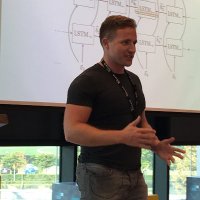
Tim Scarfe
@ecsquendor
CTO @XRAIGlass. Ex-Principal ML engineer @Microsoft. Ph.D in machine learning. CEO @MLStreetTalk pod
ID: 2282571910
https://www.youtube.com/c/MachineLearningStreetTalk 14-01-2014 23:39:44
1,1K Tweet
8,8K Followers
1,1K Following


A great interview of Federico Barbero by Tim Scarfe (for Machine Learning Street Talk), discussing our NeurIPS'24 paper. Check it out to learn more about why Transformers need Glasses! 👓 youtube.com/watch?v=FAspMn…

I'm thrilled to share this awesome conversation on Machine Learning Street Talk, featuring Jeff Beck, the CEO of Noumenal Labs, and my favourite host Tim Scarfe Tim Scarfe




ARC-AGI V2 is quite challenging. We're happy to be back at the top at 12.36! Mohamed Osman Michael Hodel Tufalabs ARC Prize

Awesome to see a keynote on open-endedness at #ICLR - way to go Tim Rocktäschel ! You have the right message at the right time and I appreciate the callout in the abstract. I wish I was there to see this. Open-endedness is the next frontier for AI as the benchmark race loses its allure.

It is critical for scientific integrity that we trust our measure of progress. The lmarena.ai has become the go-to evaluation for AI progress. Our release today demonstrates the difficulty in maintaining fair evaluations on lmarena.ai, despite best intentions.



Following release of our recent work, we have spent considerable time engaging with lmarena.ai over last week. The organizers had concerns about the correctness of our work on the reliability of chatbot arena rankings.









“How will my model behave if I change the training data?” Recent(-ish) work w/ Logan Engstrom: we nearly *perfectly* predict ML model behavior as a function of training data, saturating benchmarks for this problem (called “data attribution”).


![Stanislav Fort (@stanislavfort) on Twitter photo Isn't the Strong Model Collapse paper basically impossible to be correct since synthetic data is a huge part of frontier model training already?
> results show that even the smallest fraction of synthetic data (e.g., as little as 1% [...]) can still lead to model collapse
??? Isn't the Strong Model Collapse paper basically impossible to be correct since synthetic data is a huge part of frontier model training already?
> results show that even the smallest fraction of synthetic data (e.g., as little as 1% [...]) can still lead to model collapse
???](https://pbs.twimg.com/media/GoceC5kX0AA2OHA.jpg)


